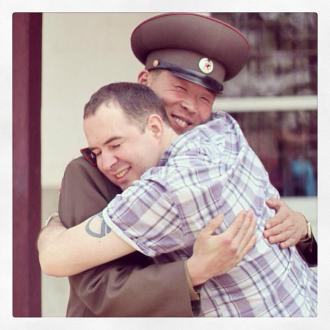The following statement below was originally published by The Pyongyang Project:

Fellow traveler and Citizen Diplomat to North Korea, Michael Bassett, hugging a 1st Lieutenant (상위) of the KPA.
For more photos by Michael Bassett, click here.
Response to BBC Panorama Documentary on North Korea

Fellow traveler and Citizen Diplomat to North Korea, Michael Bassett, hugging a 1st Lieutenant (상위) of the KPA.
For more photos by Michael Bassett, click here.
April 16, 2013
Recent news surrounding the dispute between John Sweeney, the London School of Economics (LSE), and the Panorama documentary on North Korea offers us an opportunity to evaluate the different ways we as foreigners can choose to approach North Korea.
On the one hand, we can follow Mr. Sweeney’s lead and adopt the attitude of an investigative reporter in search of ever more astonishing reminders that North Korea is indeed a whole lot different from “us”—and not in the good way. The depiction of North Korea as a nation of irate soldiers, inflammatory propaganda and oppressive brainwashing is hackneyed and simplistic at best, and both irresponsible and harmful at worst.
Mr. Sweeney and his crew visited North Korea as part of a highly restricted tour that over forty thousand other foreigners take every year. It is entirely naïve for Mr. Sweeney and his crew to assume that observations from this standard tour, specifically intended for foreign tourists, allowed them to draw meaningful conclusions about daily life in North Korea. To suggest as much, on a national stage, is extremely misleading. In an interview with the BBC, Mr. Sweeney claimed that North Korea is “more like Hitler’s Germany than other state in this world…extraordinarily scary, dark and evil.” This is a prime example of how simplistic and sensational characterizations absorb public attention away from the far more complex challenge of how to encourage productive engagement.
Criticism of Mr. Sweeney’s actions—that he placed LSE students at potential risk while also damaging LSE’s academic credibility—has been given much attention in the media and rightfully so. It should also be noted that concocting the identity of a professor and filming a documentary without permission might well have had repercussions in North Korea as well. By betraying the trust of their North Korean hosts, Mr. Sweeney and his crew unwittingly put their tour guides in personal danger. Mr. Sweeney’s claims that his actions “only deceived the government” are erroneous and betray his overly simplistic understanding of North Korea; it is false to again assume the “Government” is one cohesive unit.
For those of us who have spent years working with various North Korean ministries, bureaus, companies, institutions, committees, and universities, we understand that organizations operate with relative independence; the only group deceived would have been the tourism operator and agent with whom they arranged their tour. Should the Panorama documentary provoke negative backlash against North Korea, these tour guides may bare the brunt of the blame and the punishment. Considering the extent to which Mr. Sweeney compromised the safety of both his hosts and fellow travellers, it is disappointing that his ruse failed to reveal anything more constructive.
There are more creative ways to approach North Korea. Through our organization we have been working regularly with North Korean students, professors and professionals for the last five years; bringing them abroad for educational enrichment programs, and organizing exchange activities with them in North Korea. We have also brought many Western students to North Korea, South Korea and Northeast China to participate in study tours, language learning programs, and athletic exchanges. What we see is the dedication our North Korean students have for their studies, waking up everyday at six in the morning to prepare for class, asking for extra classroom time and homework to reinforce their lessons, making the most of the opportunity to study abroad under foreign professors. What we do is bring together different viewpoints of Chinese, South Korean, North Korean, and Western professors and practitioners to examine the issues in Korea from as many angles and standpoints as possible. The result: extreme complexity, high emotions, and a very human will to empathize with one another. It is time to be responsible and act constructively; and to stop using the misfortune of others as an entertaining horror show.
Here in Canada alone, there are universities and non-profit organizations implementing educational exchange projects to train North Korean students and professors in economics and humanities. There are also organizations working actively to provide humanitarian assistance to people throughout the North Korean countryside. Can Mr. Sweeney’s eight days looking at the country from a very limited lens rife with preconceived notions and half-baked analysis shed as much light on the reality of life in North Korea as years of on the ground experience?
In the face of heightened geopolitical tension the last thing the world needs is more fodder for the fire. With the increased media scrutiny, Mr. Sweeney has a unique opportunity to shift focus away from the customary narrative of North Korea as an irascible pariah state and elicit conversation on what can be done to make things better.
Pyongyang Project Management Team
it seems you have a better way of solving the problem that is north korea. not good.
Good post, and thank you. There’s nothing more infuriating than watching one of these documentaries, hearing the narrator explain how deviation could end in death or torture, and seeing a cut to a scene where the same narrator then tries to goad his handler or someone who invited him/her into their home into the situations he just explained were “deadly”.